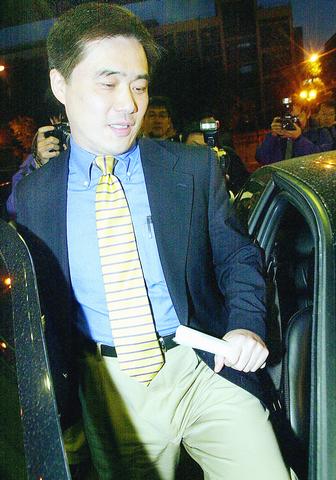New Party convener Hau Lung-bin (
Hau, a legislator and head of the New Party's Central Policymaking Committee, said that though his political stance and ideology were at odds with the DPP's, he would join the Cabinet to prove that the New Party "really loves Taiwan."

PHOTO: LIN CHENG-KUNG, TAIPEI TIMES
"President Chen Shui-bian (
Hau was invited by Premier Chang Chun-hsiung (
"I told the premier and the president that I will not change my political stance on issues such as [Taiwan's] statehood and cross-strait policy, to satisfy the DPP's ideology [on advocating independence]" Hau said.
"I also told them that I will consistently support the continued construction of the Fourth Nuclear Power Plant and that I will oppose a plebiscite on the issue ... unless the Legislative Yuan passes a [referendum] law," Hau said.
Hau, whose party is ardently unificationist and has in recent years become little more than a mouthpiece for Beijing, said that the president promised to give him free rein as the new EPA chief.
"The New Party has consistently voiced its concern for Taiwan's environmental protection and now I can realize my party's ideals through this opportunity," Hau said.
Hau was asked to join the Cabinet when the DPP took power in May, but he refused an invitation from then-premier Tang Fei (唐飛).
Hau said previously that if he took over as head of the EPA, he would have to resign as convener within the New Party and give up his seat in the legislature.
Meanwhile, the premier yesterday continued to consult with close advisors and the president to decide a final list of names for the upcoming Cabinet reshuffle.
"The heads of the Atomic Energy Council (AEC) and National Science Council (NSC) will be replaced," said a senior aide to the president, who refused to be named. The source added that Wei Che-he (
"As to whether to nominate a new education minister to succeed Ovid Tzeng (

DAREDEVIL: Honnold said it had always been a dream of his to climb Taipei 101, while a Netflix producer said the skyscraper was ‘a real icon of this country’ US climber Alex Honnold yesterday took on Taiwan’s tallest building, becoming the first person to scale Taipei 101 without a rope, harness or safety net. Hundreds of spectators gathered at the base of the 101-story skyscraper to watch Honnold, 40, embark on his daredevil feat, which was also broadcast live on Netflix. Dressed in a red T-shirt and yellow custom-made climbing shoes, Honnold swiftly moved up the southeast face of the glass and steel building. At one point, he stepped onto a platform midway up to wave down at fans and onlookers who were taking photos. People watching from inside

MAKING WAVES: China’s maritime militia could become a nontraditional threat in war, clogging up shipping lanes to prevent US or Japanese intervention, a report said About 1,900 Chinese ships flying flags of convenience and fishing vessels that participated in China’s military exercises around Taiwan last month and in January last year have been listed for monitoring, Coast Guard Administration (CGA) Deputy Director-General Hsieh Ching-chin (謝慶欽) said yesterday. Following amendments to the Commercial Port Act (商港法) and the Law of Ships (船舶法) last month, the CGA can designate possible berthing areas or deny ports of call for vessels suspected of loitering around areas where undersea cables can be accessed, Oceans Affairs Council Minister Kuan Bi-ling (管碧玲) said. The list of suspected ships, originally 300, had risen to about

A Vietnamese migrant worker yesterday won NT$12 million (US$379,627) on a Lunar New Year scratch card in Kaohsiung as part of Taiwan Lottery Co’s (台灣彩券) “NT$12 Million Grand Fortune” (1200萬大吉利) game. The man was the first top-prize winner of the new game launched on Jan. 6 to mark the Lunar New Year. Three Vietnamese migrant workers visited a Taiwan Lottery shop on Xinyue Street in Kaohsiung’s Gangshan District (崗山), a store representative said. The player bought multiple tickets and, after winning nothing, held the final lottery ticket in one hand and rubbed the store’s statue of the Maitreya Buddha’s belly with the other,

Japan’s strategic alliance with the US would collapse if Tokyo were to turn away from a conflict in Taiwan, Japanese Prime Minister Sanae Takaichi said yesterday, but distanced herself from previous comments that suggested a possible military response in such an event. Takaichi expressed her latest views on a nationally broadcast TV program late on Monday, where an opposition party leader criticized her for igniting tensions with China with the earlier remarks. Ties between Japan and China have sunk to the worst level in years after Takaichi said in November that a hypothetical Chinese attack on Taiwan could bring about a Japanese